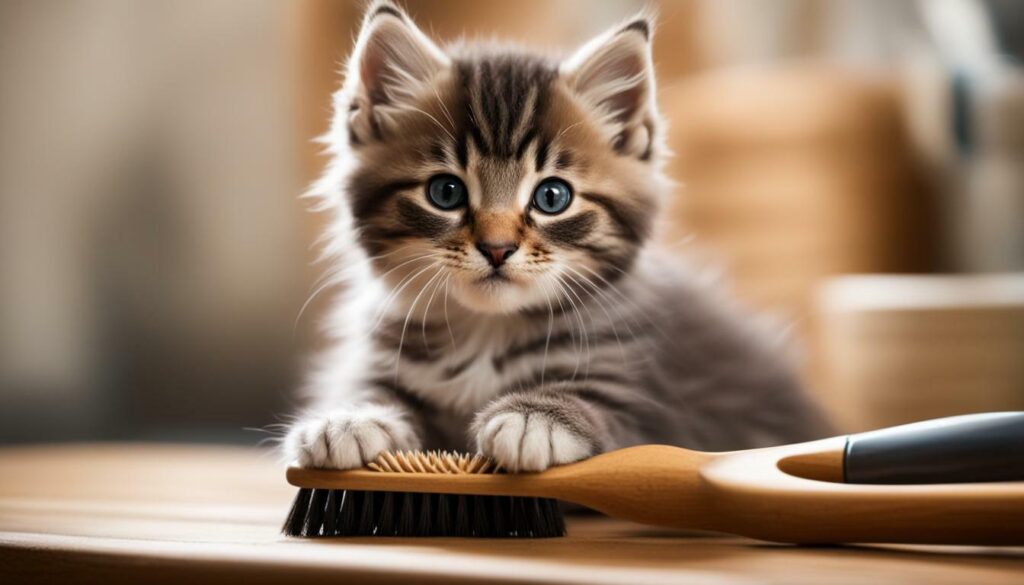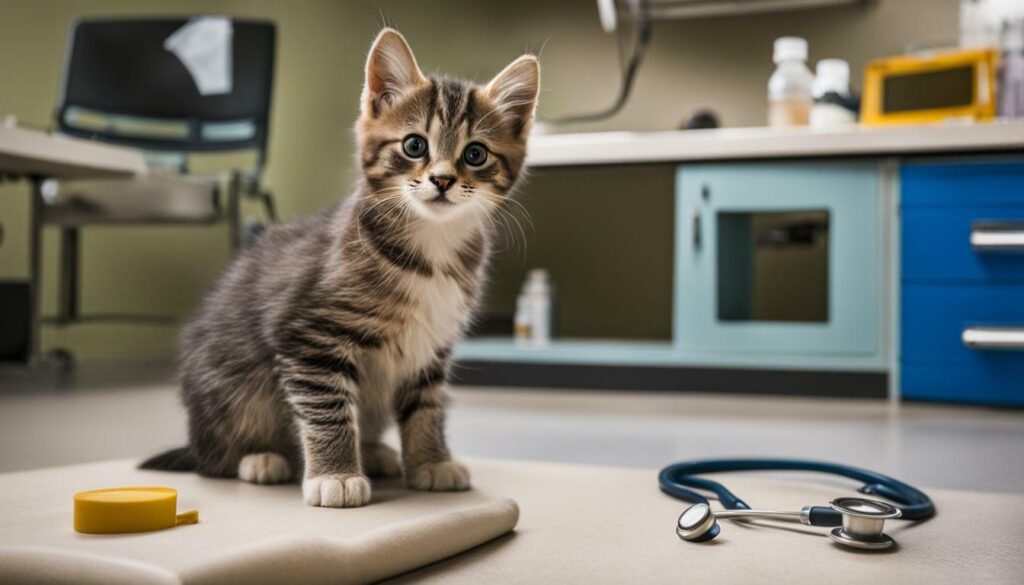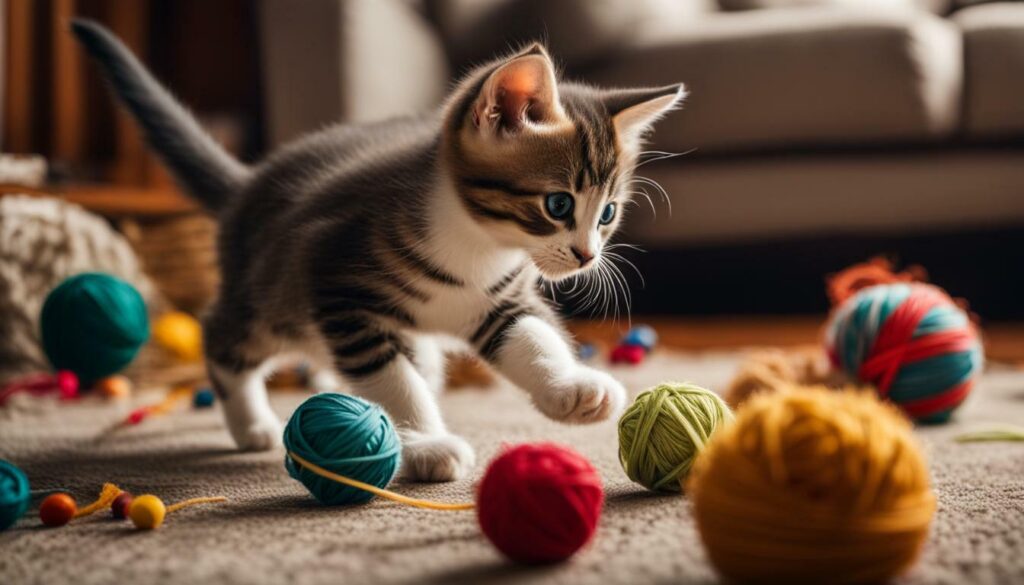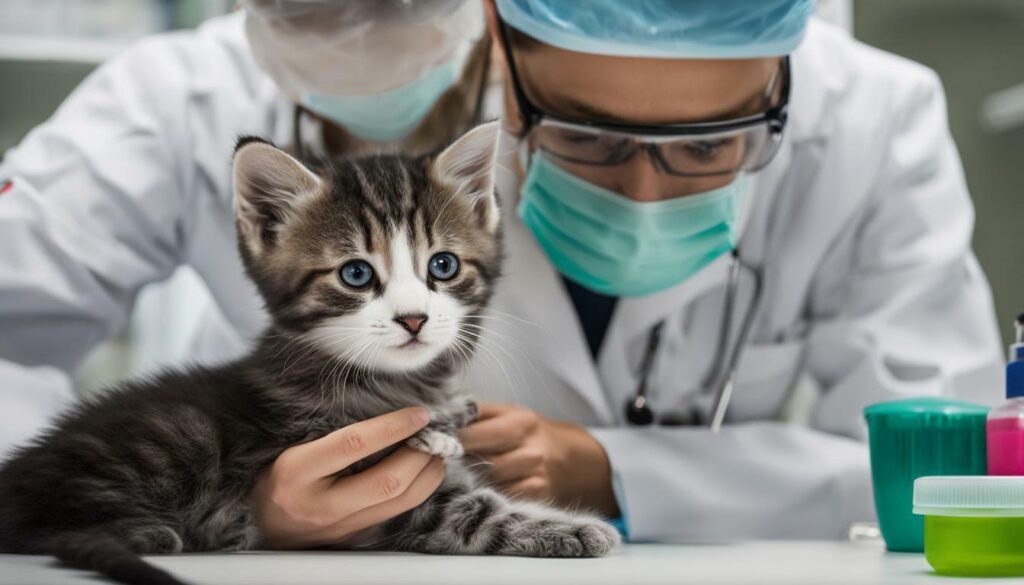Welcoming a new kitten into your home is an exciting time, but it also comes with the responsibility of providing the best care for your furry friend. In this comprehensive guide, we will walk you through all the essential aspects of kitten care to ensure your little bundle of joy thrives.
- Proper care for a kitten involves providing a healthy diet, routine veterinary care, and a safe environment.
- Kittens should be gradually introduced to solid food starting at 4 weeks old and fully weaned onto kitten food by 7 or 8 weeks.
- Feeding a nutrient-dense, meat-based diet with plenty of healthy fats is crucial for a growing kitten.
- Bonding through interactive play sessions and gradually socializing the kitten are important for their development.
- Regular veterinary visits, vaccinations, and spaying/neutering are essential for a kitten’s health.
By following this comprehensive guide, you’ll be equipped with the knowledge and tools to provide the best care for your new kitten. Let’s embark on this wonderful journey of love and companionship!
Preparing for Your New Kitten: Setting Up a Safe Environment
Before your new kitten arrives, it’s important to create a safe and comfortable environment that will cater to their needs and keep them out of harm’s way. Kittens are naturally curious and energetic, so taking the time to prepare your home will help ensure their well-being and provide them with a smooth transition.

Start by designating a quiet space where your kitten can retreat to, especially during the initial adjustment period. This area should be equipped with a cozy bed, food and water bowls, and a litter box. Placing the litter box away from their feeding area will encourage good litter box habits. Additionally, provide a scratching post or cat tree to satisfy their natural need to scratch and climb. This will help protect your furniture while also providing them with a fun and stimulating environment.
Take the time to kitten-proof your home by securing any potential hazards. Keep electrical cords out of reach, as kittens may be tempted to chew on them, which can be dangerous. Store cleaning supplies, medications, and toxic plants in cabinets or high shelves to prevent accidental ingestion. Cover any small openings or gaps where the kitten might get stuck or escape. Remember that kittens are small and agile, so it’s important to carefully inspect your home from their perspective.
Creating a Safe Outdoor Space
If you plan on allowing your kitten to go outdoors, it’s crucial to establish a safe and enclosed area where they can explore. Consider installing a cat fence or investing in a suitable cat enclosure to keep them protected from potential dangers such as traffic or predators. Providing outdoor stimulation is beneficial to their overall well-being, but safety should always be a top priority.
In summary, ensuring a safe environment for your new kitten is crucial for their well-being. By preparing your home, securing potential hazards, and providing a comfortable space, you’re setting the foundation for a happy and healthy life together.
Feeding Your Kitten: From Milk to Solid Food
As your kitten grows, their nutritional needs will change, and it’s important to provide them with a balanced diet that supports their growth and development. The transition from milk to solid food is a significant milestone in their development, and it’s essential to introduce this process gradually.
Weaning: Around 4 weeks of age, kittens start showing interest in solid food. You can introduce them to a soft, moistened kitten food mixed with a small amount of formula or kitten milk replacer. Offer this mixture in shallow dishes that are easy for them to access.
Kitten Food: By 7 or 8 weeks of age, kittens should be fully weaned onto a high-quality kitten food. Look for a commercial brand that is specifically formulated for kittens. Their diet should be nutrient-dense and primarily meat-based, as kittens require more protein and fat than adult cats for healthy growth.
To ensure your kitten receives all the necessary nutrients, choose a kitten food that is labeled complete and balanced. Avoid feeding them homemade or adult cat food, as these may not meet their unique nutritional requirements.
| Feeding Tips: |
|---|
| 1. Feed your kitten several times a day, as they have small stomachs and need regular meals to support their growth. |
| 2. Provide fresh water at all times to keep your kitten hydrated. |
| 3. Avoid overfeeding, as excess weight can lead to health problems. Follow the feeding guidelines on the kitten food packaging. |
| 4. Gradually transition them to a new brand or flavor of kitten food to avoid digestive upset. Mix a small amount of the new food with the old, gradually increasing the proportion over a week. |
Remember, each kitten is unique, and their feeding requirements may vary. Monitor their growth and consult with your veterinarian if you have any concerns about their diet or nutritional needs.
Quote:
“Proper nutrition is vital for the healthy growth and development of your kitten. By providing a balanced diet and following feeding guidelines, you are setting the foundation for a happy and healthy life.”

Ensuring your kitten receives the right nutrition is just one aspect of their overall care. The next section will delve into the importance of bonding and socializing with your kitten, creating a strong relationship that will last a lifetime.
Bonding and Socializing: Creating a Strong Relationship
Building a strong bond with your kitten is not only rewarding but also crucial for their overall well-being and happiness. Socializing your kitten from a young age helps them develop the necessary skills to interact with people and other animals. It also promotes confidence and reduces the risk of behavioral issues in the future.
To bond with your kitten, schedule regular playtime sessions. Play is not only fun but also a way to stimulate their physical and mental development. Use interactive toys, such as feather wands or laser pointers, to engage their predatory instincts. This will help keep them entertained and provide an outlet for their energy.
Socializing your kitten involves gradually introducing them to different environments, sounds, and people. Start by inviting friends and family over to interact with your kitten in a calm and controlled setting. Encourage gentle handling and positive experiences to help them build trust and associate humans with positive interactions. Provide treats and praise to reward good behavior, reinforcing the bond between you and your kitten.
Quotes:
“A well-socialized kitten grows up to be a confident and well-adjusted adult cat.” – Dr. Jane Smith, Veterinary Behaviorist
It is important to introduce grooming and dental care to your kitten early on. Handle their paws, ears, and mouth gently to get them used to being touched. Brush their fur regularly to keep it clean and free from mats. Start by using a soft brush or comb and gradually introduce nail trims to prevent scratching accidents.
Remember, building a strong bond takes time and patience. Be consistent with your interactions and provide a safe and loving environment for your kitten to thrive. With proper socialization and care, you can create a strong relationship with your furry friend that will last a lifetime.

| Key Tips for Bonding and Socializing |
|---|
| 1. Schedule regular playtime sessions to bond with your kitten. |
| 2. Gradually introduce your kitten to new environments and experiences. |
| 3. Use positive reinforcement and rewards to encourage good behavior. |
| 4. Introduce grooming and dental care early on to establish a routine. |
| 5. Provide a safe and loving environment for your kitten to thrive. |
Grooming and Dental Care: Keeping Your Kitten Clean and Healthy
Keeping your kitten clean and healthy goes beyond regular feeding, and incorporating grooming and dental care into their routine is essential. Grooming not only keeps their fur looking beautiful but also helps prevent matting and reduces the risk of skin infections. Additionally, dental care is crucial for maintaining healthy teeth and gums, preventing dental diseases, and ensuring your kitten’s overall well-being.
When it comes to grooming, regular brushing is key. Not only does it remove loose hair and prevent it from being swallowed, but it also stimulates blood circulation and promotes a healthy coat. It’s important to use a soft brush or comb specifically designed for kittens to avoid causing any discomfort.

In addition to brushing, you should also introduce your kitten to nail trimming early on. This helps prevent them from scratching furniture or accidentally hurting themselves. It’s important to use cat-specific nail clippers and trim just the very tip of each nail, taking care not to cut into the quick.
When it comes to dental care, introducing your kitten to teeth brushing from an early age is crucial. Start by gradually getting them used to having their mouth touched, and then slowly introduce a feline toothbrush and toothpaste. Regular brushing helps remove plaque and tartar buildup, reducing the risk of dental diseases such as gum inflammation and tooth decay.
Grooming and Dental Care Tips:
- Brush your kitten’s fur gently and regularly to keep it clean and tangle-free.
- Trim your kitten’s nails regularly to prevent scratching and injury.
- Introduce teeth brushing gradually and use feline-specific toothbrushes and toothpaste.
- Provide your kitten with appropriate chew toys to promote dental health.
- Regularly check your kitten’s ears for wax buildup or signs of infection, and consult a veterinarian if necessary.
| Grooming and Dental Care Checklist | Frequency |
|---|---|
| Brushing | Several times a week |
| Nail trimming | Every 2-4 weeks or as needed |
| Teeth brushing | At least 2-3 times a week |
| Ear cleaning | As needed |
Incorporating grooming and dental care into your kitten’s routine not only helps keep them clean and healthy but also strengthens the bond between you and your furry friend. By providing them with the care they need, you’re ensuring that they’ll grow up to be happy and healthy cats.
Regular veterinary care is vital to ensure your kitten stays healthy, receives necessary vaccinations, and is protected from common diseases. As a responsible pet owner, it is your responsibility to schedule routine health checks for your kitten. During these visits, your veterinarian will assess your kitten’s overall health, monitor growth, and administer necessary vaccinations.
Vaccinations play a crucial role in safeguarding your kitten’s well-being. They help prevent serious diseases such as feline distemper, rabies, and feline leukemia virus. By following a recommended vaccination schedule, you can provide your kitten with the best chance of a long and healthy life.
In addition to vaccinations, your veterinarian will also discuss spaying or neutering your kitten. This procedure not only helps control the pet population but also has numerous health benefits for your kitten, including a reduced risk of certain cancers and behavioral problems.
During veterinary visits, your veterinarian may also recommend additional preventive measures, such as flea and tick control, heartworm prevention, and dental care. These proactive steps can help protect your kitten from external parasites, internal parasites, and dental issues.
Remember, veterinary care is not just about treating illnesses; it is about maintaining your kitten’s overall well-being. Building a strong relationship with your veterinarian ensures that you have a trusted partner in providing the best care for your furry friend.

To summarize, regular veterinary care is essential for your kitten’s health and development. By scheduling routine check-ups, administering vaccinations, and following preventive measures, you can ensure your kitten grows into a happy and healthy adult cat. Remember to establish a strong bond with your veterinarian and seek their guidance on any concerns or questions you may have. With proper veterinary care, your kitten will have the best start in life.
Training your kitten is an important part of their development, as it helps them understand boundaries and establishes good behavior in their new home. One of the first house rules to teach your kitten is how to use the litter box. Cats are naturally clean animals and instinctively know to use a litter box, but they may need some guidance at first.
To start litter box training, place the litter box in a quiet, easily accessible area. Show your kitten where it is and gently place them in it after meals or naps. Be patient, as accidents may happen initially. When accidents occur outside the litter box, clean up the mess without scolding your kitten. Punishment can cause fear and anxiety, making litter box training more challenging.
Creating a positive association with the litter box is essential. Use a litter that is appropriate for kittens and regularly clean the box to keep it fresh. If you have multiple cats, it’s best to provide each cat with their own litter box to avoid competition and potential conflicts.
| Training Tips: | Common Mistakes to Avoid: |
|---|---|
|
|
H3: The Importance of Consistency
Consistency is key when it comes to training your kitten. Establish a routine and stick to it. Feed your kitten at regular times, play with them, and provide plenty of opportunities for exercise. Consistent interactions and positive reinforcement will help your kitten understand the house rules and develop good behaviors.
Remember, training takes time and patience. Your kitten may not learn everything overnight, but with consistent training, they will gradually adapt to their new environment. Training your kitten not only sets them up for a balanced and happy life but also strengthens the bond between you and your feline friend.

Now that you have the basics of training your kitten and introducing house rules, you are well on your way to raising a well-behaved and happy cat. The next section will focus on common health issues that kittens may encounter and when to seek veterinary help.
Common Health Issues and When to Seek Veterinary Help
While providing proper care for your kitten minimizes the risk of health issues, it’s important to be aware of common problems and know when to seek veterinary assistance. Even with the best care, kittens can still experience certain health issues. Being vigilant and proactive in addressing these issues can help ensure the well-being of your furry friend.
One common health issue that kittens may encounter is gastrointestinal upset, which can present as diarrhea or vomiting. This can be caused by dietary changes, infections, or parasites. If your kitten experiences persistent or severe gastrointestinal symptoms, it’s crucial to consult a veterinarian. They can provide guidance on dietary adjustments, prescribe medications, and rule out any underlying medical conditions.
Remember: Maintaining proper oral health is essential for kittens. Dental problems, such as gum disease and tooth decay, can lead to pain and difficulty eating. Regular dental care, including brushing your kitten’s teeth and providing appropriate chew toys, can help prevent these issues. If you notice any signs of dental discomfort, such as bad breath, drooling, or difficulty chewing, it’s important to seek veterinary assistance.
| Common Health Issues | Signs/Symptoms | When to Seek Veterinary Help |
|---|---|---|
| Respiratory infections | Sneezing, coughing, nasal discharge, difficulty breathing | If symptoms persist or worsen |
| Parasites (fleas, ticks, worms) | Intense scratching, hair loss, weight loss, diarrhea | If infestation is severe or persists despite treatment |
| Urinary tract infections | Frequent urination, blood in urine, straining to urinate | If these symptoms are observed |
Regular veterinary check-ups are essential for monitoring your kitten’s overall health and catching any potential issues early on. Vaccinations are also crucial to protect against common feline diseases. Your veterinarian can recommend the appropriate vaccination schedule for your kitten based on their age and lifestyle.
By staying informed about common health issues, practicing preventive care, and seeking veterinary help when necessary, you can ensure that your kitten stays healthy and happy for years to come.

Caring for a kitten is a rewarding experience that brings joy and companionship into your life, and with the right knowledge and care, you can ensure your little ball of fur grows up healthy and happy. Providing a healthy diet is crucial for their growth and development. Kittens should start solid food around 4 weeks and be fully weaned onto a nutrient-dense, meat-based kitten food by 7 or 8 weeks of age. Feeding them several times a day will support their rapid growth.
It’s not just about food, though. Bonding with your kitten through interactive play sessions is essential for their social and emotional well-being. Gradually introducing grooming and dental care early on will help them get used to these habits for a lifetime of good hygiene. Regular visits to the veterinarian for health checks, vaccinations, and spaying/neutering are vital to ensure their overall health and prevent any potential issues.
Creating a safe and stimulating environment is also important. Providing toys, scratching posts, and a clean litter box will keep them entertained and satisfied. By following these guidelines and ensuring their well-being, you can enjoy the many years of love and companionship that your kitten will bring to your life.
FAQ
Q: What should I feed my kitten?
A: Kittens should be fed a nutrient-dense, primarily meat-based diet. Start them on solid food around 4 weeks and fully wean onto kitten food by 7 or 8 weeks of age. Feed them several times a day to support their growth.
Q: How often should I play with my kitten?
A: Playing with and bonding with your kitten is important. Interactive play sessions are recommended to keep them mentally stimulated and physically active. Aim for at least two play sessions per day.
Q: When should I start grooming my kitten?
A: It’s important to introduce grooming early on. Start by gently brushing their fur, trimming their nails, and cleaning their ears. This will help them become comfortable with grooming as they grow older.
Q: How often should I take my kitten to the vet?
A: Regular veterinary visits are essential for your kitten’s health. They should receive vaccinations, health checks, and be spayed or neutered. Follow your vet’s recommendations for scheduling these visits.
Q: How can I keep my home safe for my kitten?
A: To keep your home safe, secure potential hazards like toxic plants and chemicals. Provide toys and scratching posts to redirect their play. Keep a clean litter box to maintain hygiene.
Q: What are common health issues in kittens?
A: Common health issues in kittens include parasites, respiratory infections, and gastrointestinal upsets. If you notice any signs of illness, such as loss of appetite or lethargy, consult your vet.
Q: When should I start litter box training?
A: Start litter box training as soon as you bring your kitten home. Show them the litter box and gently place them in it after meals or naps. Use a litter that is appropriate for kittens.
Q: How can I socialize my kitten?
A: Gradually introduce your kitten to new people, experiences, and environments. Offer positive reinforcement and rewards for calm, friendly behavior. This will help them become confident and well-adjusted cats.






